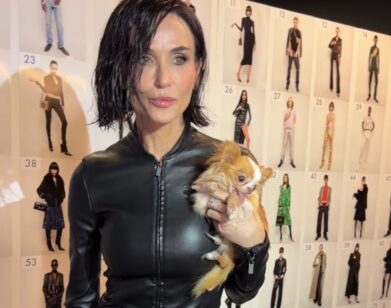Kim Petras Says It’s Okay to Be Sad in the Club

Photo by Byron Spencer.
Kim Petras has positioned herself as the next big pop star princess, and she’s ready to reign. You might have heard one of her songs on the radio in the past year, or maybe you’ve seen her Barbie pink-hued music video featuring real-life Barbie Paris Hilton. Petras has been under the spotlight for years, having made her first TV appearance at 12-years-old in her native Germany. But it wasn’t her music that put her under the spotlight at such an early age. Petras grabbed the attention of the media for allegedly being the youngest person in the world to have gender confirmation surgery. “I feel proud to be a trans girl,” she says. “On my way to becoming a legit pop star.” At the ripe age of 19, Petras moved to L.A. and began writing songs about the life she had always wanted, which included boys, fame, and shopping sprees. And her pursuit of pop stardom is finally paying off. In 2018 alone, she toured with Troye Sivan, her song “Heart to Break” entered the radio Top 40, and she released Turn Off The Light, Vol. 1, a spooky EP featuring a collaboration with none other than Elvira, Mistress of the Dark. On top of that, she performed, as she put it, “in every gay club there is.” This year, the singer is due to release her first full-length album, for which she’s been rolling out singles nearly every week. The new music shows a different side of Petras—one that is hurt, self-aware, hungry for growth, and ready to party. Her most recent single, “All I Do Is Cry,” takes her music to a sad, almost emo direction, laced with trap beats and lyrics bemoaning a broken heart. Between photo shoots and packing for a trip back to L.A., Petras spoke with Interview about her sold-out tour, aptly titled the Broken Tour, the follow-up to her campy EP, and her vow to never, ever, leave gay clubs behind her. As a wise prophet once said, “first come the gays, then the girls, then the industry!” So much is true for this pop star.
———
ERNEST MACIAS: After listening to “All I Do Is Cry,” I have to ask: Who hurt you?
KIM PETRAS: My ex. I was very sad and just kind of … Well, I’ve changed a lot.
MACIAS: It surprised me, honestly. All the music that you’ve previously released has been super high-energy pop, or campy, like Turn Off The Light Vol. 1.
PETRAS: Really at the core, it’s just me growing and changing as a person. The first batch of songs I wrote, that was me being pretty insecure. Because as an immigrant from Germany coming to America, I thought nobody would want to listen to my songs. But then people really listened, and now I have a fan base. I think that gave me a tremendous amount of confidence in myself and in making the music that I want to make. This is just straight-up what felt right for me to do—what I felt the most passionate about. I’ve been really obsessed with Astroworld, and Post Malone, and I’ve kind of gone back to listening to 808s & Heartbreak a bunch.
MACIAS: What a good album. One of my all-time favorites.
PETRAS: Mine too! I think that album is super-incredible. I also listened to Lana Del Rey a bunch, and a lot of other albums on the sadder spectrum of music. But I think that process of making sad songs can be fun too. I think when I heard Juice WRLD‘s break-up song, I thought, “Oh this song is so much fun to sing along with all your friends.” But it’s really sad and emo. I got really inspired by songs that are sad in a really fun way.
MACIAS: Your earlier songs like “I Don’t Want It All” or “Heart To Break” don’t feel as vulnerable as “All I Do Is Cry.”
PETRAS: I love those songs and they’re really authentic to me, and I’m really obsessed with them, but with the new ones, I feel like I’m being more real and more me. Before, I was writing about the life I wished to have. I was singing about a pretty fancy life, meanwhile I was sleeping on a futon with four roommates and struggling hard. I’m not rich. I was a waitress and saved up my money to come to L.A. and be a songwriter, but nobody would sing my songs. Now, I feel like my fans are my friends and I want the new songs to feel like they’re hanging out with me and we’re having a talk about life. These songs, they’re more like my attitude to life—shit gets bad, but you always pick yourself back up.
MACIAS: That’s a good message to give to your fans, but the other day you tweeted something, sort of explaining to your fans your new music. How do you deal with these preconceived expectations of the music you should be making?
PETRAS: When people hear something that they like and they become a fan of somebody, they want that same thing again. I don’t want to be like, “Oh, this song was big for me, let’s do something exactly like it.” I did a bunch of shows last year and every single song felt super hyper and a total party. As an artist, what other flavors do I need and how can I push forward, instead of looking back and just repeating myself? I know that’s the harder way to go. So this, for me, feels really free. I know there are going to be fans who want me to do the same music that I did a year ago. My opinion is, go and listen to those songs. I’m still going to sing them at every concert, nothing’s changing with those songs. But it was important for me to grow, because all my favorite artists do. They re-invent and find new things to get inspired by.
MACIAS: Do you remember where you were when you first heard one of your songs on the radio?
PETRAS: It was “Heart To Break” and it was in a restaurant in New Orleans. Since then, I’ve heard it a bunch. I did a huge radio tour all over America last year when my song got into the radio Top 40. It was just nuts.
MACIAS: You’ve performed in every gay club possible and have a big following among young LGBTQ kids. Do you feel like you carry a big responsibility to the community?
PETRAS: I love that I give people an escape at my shows. I have die-hard fans who know every single word to every single one of my songs. I feel flattered and honored that people would be inspired by me. It’s really cool. I don’t really feel pressure. I feel proud to be a trans girl, on my way to becoming a legit pop star.
MACIAS: You’ve experienced a lot of growth in the past year. How do you feel about the journey that you’ve had up to this moment?
PETRAS: I know that I’ve worked really hard to be here, I’ve worked since I was 14, but I feel really blessed to be in the spot that I’m in right now. I’ve performed in every gay club there is. I’ve been hustling for years. Getting on the radio and hearing my songs at freaking Starbucks—I was really emotional about that. Although, I went through a hard time on tour and had a big fat heartbreak. I felt bad for feeling bad. I’ve been spending every single day in the studio, I feel like I don’t have a life outside of this. I’m not with a major label, I’m not with an indie player label, I’m my own label. So I’m doing a thousand things and I’m involved in every little detail.
MACIAS: You’re about to go on tour—your first ever headlining tour. How is that different from the previous shows you’ve done?
PETRAS: It’s the first time I really get to do what I want. I get to actually dress up my stage, make it what I want to make it. It’s really cool. I’m doing a bunch of intros and interludes, building a legit show. It’s been a long journey to getting to my first tour, and selling it out immediately was really sick. I want it to be perfect. I’m also trying to write Turn Off The Light before that tour, so let’s see how it goes.
MACIAS: So Vol 2. is happening, that’s a lot on your plate. You were nominated for a GLAAD Media Award for breaking barriers as a music artist. I’m curious, what does breaking barriers mean to you?
PETRAS: It’s been a little hard dealing with being transgender and balancing every interview only talking about being transgender instead of my music. At times, I’ve had to downplay it, so that people wouldn’t just talk about that. I want to be taken seriously as an artist. I think that for the media, it’s been difficult to talk about anything else but the fact that I’m transgender. I started going on TV shows in Germany when I was 12, so it feels great to get acknowledged for that and especially from GLAAD. I’ve been fighting for trans rights my whole entire life, I’ve been part of the LGBTQ community my whole life. This feels fucking amazing. I know that people have opinions and some say “You’re using being transgender to be a pop star,” which couldn’t be further from the truth. People actually didn’t want to sign me because I’m transgender—like, that legit happened—so it gives me all these crazy feelings about how twisted people’s perception of me is. But GLAAD thinks I’m worth a nomination, so I’m doing something right.
MACIAS: I think you’re doing a lot of things right. What’s the message to take from this new era in your career?
PETRAS: I hope my fans can go and party to a bunch of the music that’s coming. I’m not abandoning the gay clubs ever—it’s never going to happen. I feel like the cat is out of the bag with “Sweet Spot.” I’m not only making emo songs. I hope people love these songs, they mean absolutely everything to me. I wrote them down in my freaking diary and put a lot of work into them. I’m really proud of them and I just hope you fuck with them.






